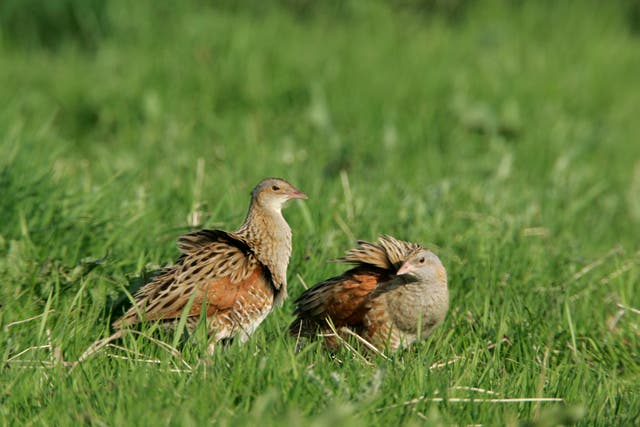
The number of rare corncrake birds in Scotland has risen for the first time in five years, according to a wildlife charity.
The Royal Society for the Protection of Birds (RSPB) Scotland’s annual survey recorded 870 calling male corncrakes, compared to 828 last year.
The charity says the figure takes the numbers of corncrakes in Scotland back to levels not seen since 2019 (867) and it marks an “important result” in efforts to save the birds.
Corncrakes are small brown birds which spend the winter months in Congo but migrate back to a few places in Scotland to breed.
They are recorded by counting the number of calling male birds making the distinctive “crex crex” noise at night during the breeding season.
READ MORE: Endangered male giraffe arrives at safari park
The rise has been attributed to partnership working in corncrake areas with local communities, which the charity says has increased the quality and quantity of suitable habitats and corncrake-friendly land management practices.
The islands of Coll, Tiree and Lewis – where land management is in place to make the environment welcoming to corncrakes – have all seen significant increases in the number of males heard this year.
Over winter, vegetation corridors of irises, nettles and cow parsley are encouraged to grow by controlling how they are grazed by livestock, usually using fences, and spreading manure. The birds use these as cover from predators to move about and hide in.
In summer, later mowing dates are required to ensure their nests and chicks are not destroyed.
RSPB Scotland director Anne McCall said the result this year “brings hope of a turning point”.
 The RSPB has welcomed an increase in the number of calling male corncrakes in Scotland (Andy Hay/RSPB/PA)
The RSPB has welcomed an increase in the number of calling male corncrakes in Scotland (Andy Hay/RSPB/PA)
She said: “These results are a significant moment for efforts to save corncrakes in Scotland and a real tribute to the enormous collective effort of farmers, crofters and local communities to help these birds through corncrake calling.
“While we need to see sustained rises year on year to reverse the decline in corncrake numbers, this year’s result of 870 brings hope of a turning point.
“It shows that targeting the quality and quantity of corncrake-friendly habitat and land management yields results.
READ MORE: Over 120 new species is at risk of extinction in Scotland
“Corncrakes only live for a couple of years, so it’s vital that as many chicks as possible survive each year to make their great migration south.
“These birds used to be found across the UK, so these few areas in Scotland are very special.
“Corncrake calling has allowed us to really focus our efforts with these communities to safeguard their future here and shows the collaborative approach needed across the country to help reverse nature declines.”



Why are you making commenting on The Herald only available to subscribers?
It should have been a safe space for informed debate, somewhere for readers to discuss issues around the biggest stories of the day, but all too often the below the line comments on most websites have become bogged down by off-topic discussions and abuse.
heraldscotland.com is tackling this problem by allowing only subscribers to comment.
We are doing this to improve the experience for our loyal readers and we believe it will reduce the ability of trolls and troublemakers, who occasionally find their way onto our site, to abuse our journalists and readers. We also hope it will help the comments section fulfil its promise as a part of Scotland's conversation with itself.
We are lucky at The Herald. We are read by an informed, educated readership who can add their knowledge and insights to our stories.
That is invaluable.
We are making the subscriber-only change to support our valued readers, who tell us they don't want the site cluttered up with irrelevant comments, untruths and abuse.
In the past, the journalist’s job was to collect and distribute information to the audience. Technology means that readers can shape a discussion. We look forward to hearing from you on heraldscotland.com
Comments & Moderation
Readers’ comments: You are personally liable for the content of any comments you upload to this website, so please act responsibly. We do not pre-moderate or monitor readers’ comments appearing on our websites, but we do post-moderate in response to complaints we receive or otherwise when a potential problem comes to our attention. You can make a complaint by using the ‘report this post’ link . We may then apply our discretion under the user terms to amend or delete comments.
Post moderation is undertaken full-time 9am-6pm on weekdays, and on a part-time basis outwith those hours.
Read the rules here